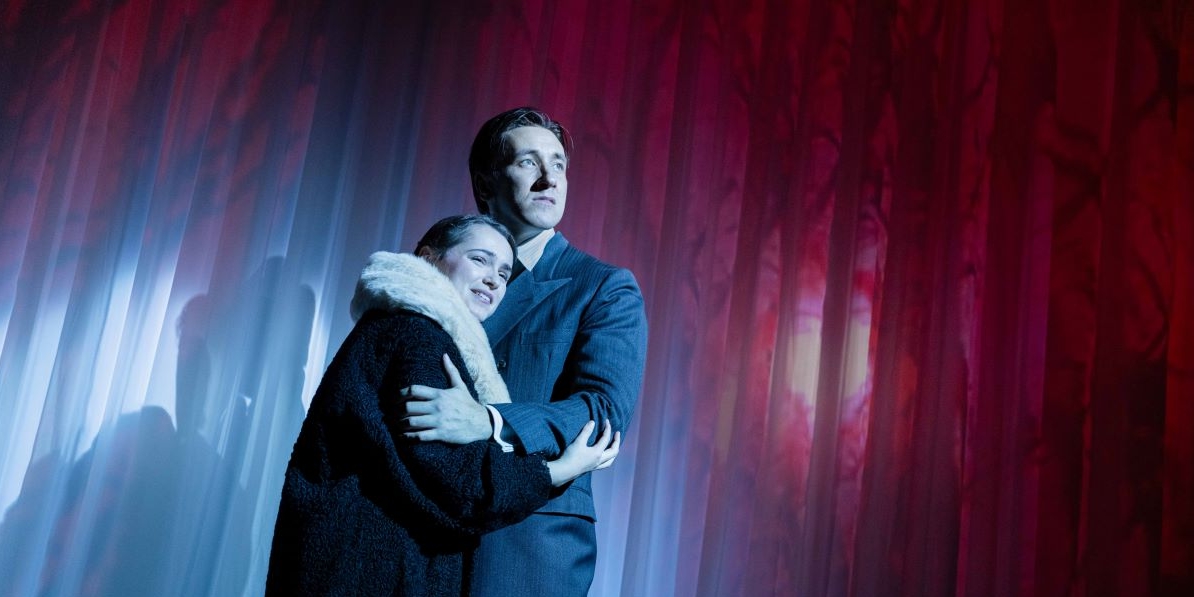On the face of it, Daphne du Maurier’s gothic thriller ‘Rebecca’ is ideal fare for a musical. Set in Monte Carolo and on a wave-churning Cornish coast, it involves an exquisite mansion owned by a reserved but debonair English gentleman, who acquires an apparently timid and mousy second wife, who reveals herself as the narrator of a tale of discovery; a tale in which the ubiquitous influence of the first wife – Rebecca – is revealed and focused in on the malignant figure of Mrs Danvers, housekeeper at Manderley.
And that is a sense the problem – in the musical adaptation it is the character of Mrs Danvers that dominates dramatically and musically over everyone and everything else. Her psycho-sexual engagement with her late employer and her possessions is quite the most compelling aspect of the production so that both the central romance and the mystery surrounding Rebecca’s demise are put in the shade – this is suddenly more the territory of ‘Jane Eyre’ than ‘Rebecca’. Given that the musical, which first saw the light of day back in 2006 in Vienna, is a German-language original, perhaps we should see it as a product of German Romanticism instead.
There is no doubt that this musical is sung well. All the main characters have at least one song each and the three leads have a lot of work to do, which they deliver with commitment and engaged acting too. Lauren Jones, in the narrator role, grows in presence as the musical progresses, eventually revealing herself to be a not wholly neutral or reliable story-teller. She has a lovely voice and is exactly right for the role. Robert Carson, as the enigmatic Maxim de Winter, is less characterful, but that is more a comment on the way the musical is put together which does not give him much scope for self-revelation or character development. On the evening I attended Melanie Bright sang the role of Mrs Danvers and gave a physically and musically commanding performance. Among the lesser roles, Alex James-Ward stood out as the oily blackmailer, Jack Favell. The staff of Manderley act as the chorus and offer an incisive commentary on the action.
You have a definite feeling of a very limited budget for this production. Manderley, so far from being a Georgian jewel, was rendered in a series of revealed screens and flaps and reminded me of the bleaker interiors of my Victorian school. Video projections represented the swirling surf in conventional ways, and in the Monte Carlo scenes we had to make do with the actors clambering over tables and chairs when it came to the Riviera coastline. Costumes were better provided for, though the famous eighteenth-century pastiche dress designed for the ball looked as though it had seen better days.
With an eighteen-piece orchestra there was however no stinting on the soundscape: music director Robert Scott extracted some fine solos from his players and sailed through the set-piece storm and fire sequences with panache. It is a shame that a lot of music was quite prosaic, with only the title number ‘Rebecca’ lodging in the memory. Part of the problem perhaps lies in the text of Christopher Hampton’s wordy translation from the German – there was a lot of exposition whether in song or dialogue.
While the musical holds your attention throughout, it does not in the end rise to the challenge of the novel or the Hitchcock movie derived from it.

